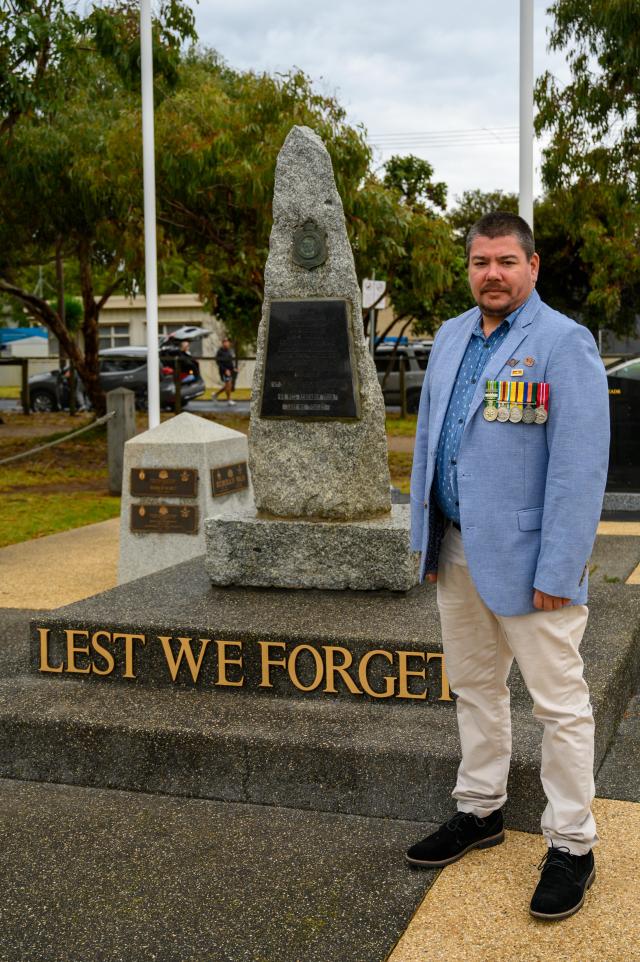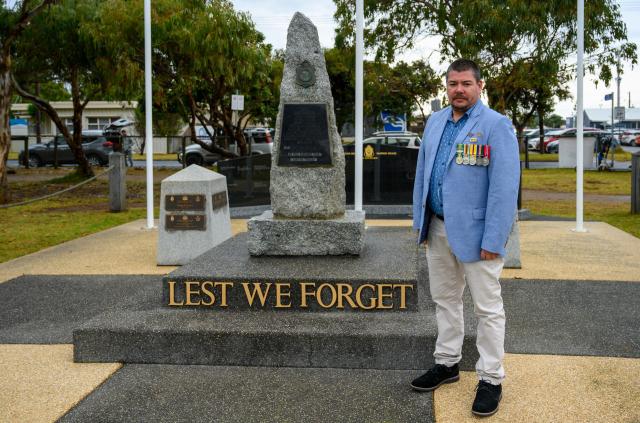Chris Laux was doing a sheet-metal apprenticeship when a twist of fate led him to a career in the Royal Australian Air Force and then an premature retirement. He speaks with Justin Flynn ahead of Anzac Day.
It was by pure chance that Chris Laux began a career with the Royal Australian Air Force more than 20 years ago.
After leaving Bellarine Secondary College, he took up a sheet-metal apprenticeship in Melbourne in 1997.
Fast forward to 2000 and Chris found himself making the hand rails for the completion of Colonial Stadium (now Marvel Stadium).
“At the time the AFL wanted the ground ready in time for the 2000 season and the unions wanted the 36-hour week so we were on strike for six months and we had a union meeting in the old Savoy Hotel on the corner of Spencer and Bourke streets,” Chris says.
“Defence Force Plaza was right next to that. So at one of the meetings we got told we were still on strike and I was a 19-year-old kid and had yet learnt to save for a rainy day, so a strike that long was very painful, and I walked in next door to Defence Force Plaza and said ‘these are my qualifications, what can I do?’.
“They said you can be a tank armourer in the army, a boilermaker in the navy or an aircraft sheet-metal worker in the RAAF. I was a sheet-metal worker already so it seemed like a good, sound option.”
Over the next 10 years, Chris was deployed to the Middle East and Asia and was involved in the 2004 tsunami and repatriating the wounded and dead from the 2002 Bali bombings.
“That was horrible,” Chris says.
“I distinctly remember saying the world was a peaceful place and a good time to get a career and I got my call up September 11, 2001 and the world was no longer a peaceful place.”
However, Chris’ military career came to an abrupt end in Dubai in 2010 when he contracted clostridium difficile, a debilitating bacterial infection that releases toxins that irritate and attack the lining of the intestines.
“It presented a lot like gastro, but after about four weeks my body started to shut down and I ended up in intensive care and that was the end of my military career,” he said.
“Over the last 10 years, I have spent about two of them in hospital. It lays dormant and then attacks. If I start to get sick with it I end up in hospital for three or four months again and then it’s months of rehab.”
One quirk of being in the military was that about 10 of Chris’ fellow Bellarine Secondary College students either in the same year, the year below or the year higher, ended up serving as well.
“People used to think we were in the defence force because of something we were taught at school, but it was just a coincidence,” he said.
Chris’ grandfather was also a veteran and he said getting to march with him on Anzac Day was probably the proudest he has been. The honour wall behind the Cenotaph at Ocean Grove Park has both Chris’ and his grandfather’s name on it and he encourages all local veterans to contact Ocean Grove Barwon Heads RSL Sub-branch to get their own names engraved.
“I marched with my grandfather several times in Barwon Heads – he was my idol,” he said.
“It was always paying respect to the older Diggers. It never really clicked that you were a veteran as well.
“As I’ve gotten older with the passing of pretty much all the [World War II] vets, time doesn’t really stop for anybody. It’s now for the younger veterans to step up and save the RSL.
“It shouldn’t be up to the 75 and 80 year olds any longer. It’s now becoming a time for the younger veterans to step up and say ‘this is our organisation’.”
Chris’ Anzac Day ritual each year is usually the same.
“I generally go to Fort Queenscliff and do the dawn service there and then do the march here in Ocean Grove,” he says.
“Then hang around and chat with some of the old boys and run into old faces.”
Chris recently raised about $1500 doing the March On Challenge for Soldier On.
The goal was to walk 96 kilometres in March for a charity organisation that helps young veterans, but Chris managed 336km.
“Veteran suicide is a massive problem,” he says.
“We’ve lost so many young veterans coming out of service and feeling lost.“








